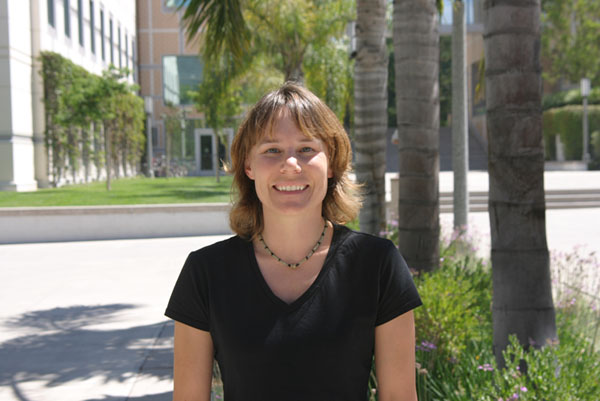Doctoral Student Awarded UCI Newkirk Center for Science and Society Fellowship
Fellowship to aid in hydrologic forecasts for the National Weather Service
September 19, 2005 -- UC Irvine civil and environmental engineering doctoral student, Kristie Franz, has been awarded the prominent UC Irvine Newkirk Center for Science and Society Fellowship to support her research project to infuse new technology into hydrologic forecasts with the National Weather Service (NWS).
The UC Irvine Newkirk Center for Science is a campus center that actively promotes the appropriate and effective uses of research in the natural and social sciences to enhance the quality of life. Franz will receive 10 months of salary and travel expenses to help complete her research, and visit NWS national offices. There, she will present her research and have the opportunity to receive direct feedback from NWS officials.
Specifically, Franz is experimenting with the study and potential advancement of NWS’s snow modeling methods. She explained that snow acts as a natural reservoir during the winter, and when snow melts in the spring, scientists are able to examine snowpack conditions and forecast stream flow using hydrologic models.
“This system allows the NWS to predict the water supply available in the spring, and provide us with the ability to share the information with municipalities, irrigators, cities, and so forth to assist them in their water planning and conservation,” Franz said.
The current snow model used by the NWS was developed in the 1970s and only measures by temperature and precipitation.
“There are many other factors affecting snow that may be important to consider when forecasting, including solar radiation, longwave radiation, humidity, and wind,” she said. “The current system has been reliable for so long, and is easy to implement because it requires few inputs, so it has rarely been re-examined.”
Franz said that with the advancements of satellite technology, she’s posing the question of whether it is a benefit to apply additional observations in operational forecasting, and if so, how they could efficiently obtain the data.
“I want to investigate and analyze if factors, such as solar radiation and humidity, have any practical use, or simply prove that we’re already utilizing the current model to the best of its abilities,” she explained.
She said that her advisor, Professor Soroosh Sorooshian, of civil and environmental engineering, has consistently provided her with financial support and opportunities to attend national and international meetings on forecasting and hydrologic sciences.
“Dr. Sorooshian has always encouraged and fostered my research collaborations and activities with scientists and organizations, in addition to our own research group, which has given me a better understanding of the breadth of the hydrologic field,” Franz said.
Along with the continued support from Sorooshian, she said the fellowship will help her finish this research project and assist her in gaining creditability for their work by supporting interaction with the NWS.
“I want to positively impact society by determining how to best utilize hydrologic forecasts. Many times in academia, we tend to gear most of our focus on research, and sometimes forget to actually apply our new technology,” Franz said.

